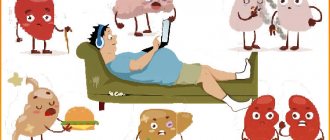Why the habit of eating at night should make you wary
In general, our body knows very well that sleeping and eating are fundamentally different processes. Therefore, when a person goes to bed, the level of leptin in his blood increases Neuroendocrine Profiles Associated with Energy Intake, Sleep, and Stress in the Night Eating Syndrome - a hormone that suppresses appetite.
After waking up, he returns to normal. But the level of ghrelin increases The role of leptin and ghrelin in the regulation of food intake and body weight in humans: a review - this hormone makes you think about whether it’s time to have a snack. This is how a healthy human body regulates appetite under normal conditions.
Sometimes glitches may occur. Perhaps you exercised too actively during the day and your body needs energy. Or you’re nervous and your brain needs extra glucose to recover. Or maybe you just drank a lot of liquid before bed, and your full bladder keeps waking you up.
In general, due to some extraordinary situation, you don’t have enough calories, you can’t really sleep, the hormonal regulation of your appetite goes wrong - and you find yourself at the refrigerator at midnight.
However, if you experience night hunger attacks at least a couple of times a week Treatment of Night Eating Syndrome, the cause may be more serious.
Scientists say that nighttime eating is quite common. Most often, Sleep-Related Eating Disorders occur in people with obesity The night-eating syndrome and obesity, as well as in those who take psychoactive substances or suffer from mental disorders.
In approximately 1.5% of the population, the prevalence of night eating syndrome and binge eating disorder among overweight and obese individuals with serious mental illness, night binge eating takes such a pronounced form that it is classified as a disorder - night binge eating syndrome.
Scientists don't know exactly why people wake up at night to snack on a regular basis. However, there are versions.
Reasons why we feel so hungry in the evening
Physiological reason
- There are people whose production of hormones such as leptin and melatonin is disrupted, which causes the biological clock to go wrong and a person may be alert in the evening and, of course, feel hungry. Moreover, during the day they may be plagued by lethargy, drowsiness and lack of appetite, especially in the morning.
Read more: Melatonin is the hormone of youth.
- High secretion of gastric juice can also make you want to eat something at night.
All for physiological reasons.
Psychological reasons
- If you suddenly, out of the blue, have a passion for late-night eating, you need to consult a psychologist. Since in this case, night hunger is the body’s reaction to excessive nervous tension, and it can also be a symptom of hidden depression. And in the evening you really want to treat yourself to something delicious to relieve stress, emotional arousal, or simply lift your spirits.
Day mode failure
- This factor is also one of the reasons why you feel so hungry in the evening. If you are used to going to bed late and naturally eat dinner late, the day you decide to go to bed early, it is quite possible that night hunger will get you out of bed. More precisely, such hunger is a consequence of the release of hormones in the gastrointestinal tract.
All day from hand to mouth
- This reason is one of the most common reasons why you want to eat so uncontrollably at night. We skipped breakfast (due to lack of time, a mistaken desire not to gain calories at least during breakfast), grabbed a sandwich for lunch, or nothing at all. How to resist eating in the evening? There are also those who are losing weight who happily report that they don’t even want to have breakfast in the morning. How can they want it if, since the evening, undigested food remains have been rotting in the digestive tract?..
Read more: 3 criteria for a proper breakfast.
Cottage cheese and a glass of kefir for dinner are no longer suitable - you need to eat once throughout the day. Others still manage to show willpower in the evening, although a little weakened by hunger. In the evening they hold back so as not to eat too much. But at night they come to their senses next to an empty pot of borscht, in one hand a stick of nibbled sausage, in the other - the remains of a kilogram of cake...
Joke.
Another option for hungry everyday life is following strict diets, mono-diets with the goal of quickly losing weight (after all, spring has come, soon you will undress and flaunt the fat rollers on your body). The body, each of whose 100 trillion cells needs more than 100 nutrients daily, receives some crumbs every day.
During the day you should be energetic, active, carry out your daily activities, breathe, walk, smile, finally, and all this happens at the expense of the body's reserves. If you haven’t given fuel to your cells in the morning, you shouldn’t be surprised that in the evening they will urgently demand theirs, and almost always receive what they need in abundance.
So stop scolding yourself for eating at night, let your conscience go for a walk, don’t suffer, just start eating normally in the morning and throughout the day, cheer yourself up not with food, but with something else and use a few simple rules that will help overcome all night hunger pangs.
What draws you to the refrigerator at night?
Here are some possible options.
You don't eat enough during the day
Neuroscientist Nicole Avena, whose professional interests include nutrition, diets, and food addictions, said in a comment to Vice that night eating occurs when people begin to starve - for example, they go on a diet that is too strict.
Nicole Avena
Neuroscientist
During the day, these people consume so few calories that their circadian rhythm is completely disrupted. They do not have enough nutrients for proper sleep. Therefore, they wake up from the fact that the body persistently demands food.
This usually goes away as the body adjusts to the dietary restrictions.
This is a side effect of an eating disorder.
Scientists have found that among those who eat at night, many people have diagnosed eating disorders. Thus, one study of Night eating syndrome in patients with eating disorders: Is night eating syndrome distinct from bulimia nervosa? showed that 51% of patients with bulimia and about 35% with anorexia tend to eat after midnight.
Kelly Ellison
Professor of Psychology at the Perelman School of Medicine at the University of Pennsylvania.
When half asleep, people have less self-control. Therefore, a person who persistently avoids food during the day may well look into the refrigerator at night.
Are you worried or living in constant stress?
Prolonged stress is a common cause of why stress causes people to overeat. Including night ones.
The same Professor Ellison found that approximately three-quarters of people who regularly eat at night have experienced some kind of stressful event. It was what disrupted their sleep patterns and made late-night snacking attractive.
Other findings from Night Eating Syndrome in Major Depression and Anxiety Disorders suggest that people with depression or anxiety disorders are more likely to engage in nighttime binge eating.
Essentially, any type of mood disorder can cause a person to wake up and eat at night.
It's just heredity
If someone close to you also wakes up from time to time at night to raid the refrigerator, you may have some kind of common gene Familial aggregation in the night eating syndrome that provokes this behavior. However, scientists have not yet calculated it.
Why do you want to eat at night: 3 main reasons
For those whose dream of losing weight for the beach season is ruined every day by the “night watch” at the refrigerator - there are 3 main reasons why this happens.
Night raids on the refrigerator are not at all uncommon, although even inveterate gluttons understand that this is wrong - there is nothing to do in the kitchen at this time of day. To wean yourself from eating at night, you first need to understand what such snacks do for your body.
We eat at night because we are undernourished during the day
Night eating can have a very simple explanation: a person eats in the middle of the night because he does not eat during the day. Or rather, he doesn’t eat normally - for some reason he skips breakfast, lunch or dinner. During the day he succeeds, but in the evening the level of self-control decreases and it becomes more and more difficult to fight the temptation to empty the refrigerator. The matter may end with the person waking up in the middle of the night, eating a pot of soup or half a cake (those who are undernourished during the day usually do not limit themselves to a couple of sandwiches, they eat thoroughly) and calmly go to bed. The next morning he will also be glad that he doesn’t feel like having breakfast, although in general there is nothing to be happy about. This diet becomes a habit, and the night eater ends up in a vicious circle: he tolerates it during the day, eats at night, is not hungry in the morning, and so on.
Not for the sake of sausage - for the sake of peace
Food, as you know, is a great way to relieve stress - hence the problem of stress eating, which leads many to excess weight and because of which it is so difficult to treat obesity. A person who opens a refrigerator in the middle of the night is not just looking for sausage, he is looking for a way to get rid of the negative emotions that have accumulated during the day. And it didn’t matter that he had been sleeping before - he was mentally in a state of tension. The next morning, a person may not remember that he chewed something in the kitchen at night.
We eat... fear
Many mature, sane people are afraid of the dark, sometimes subconsciously, without understanding their problem. This can also be a reason for eating at night. A person goes to bed, turns off the light, but cannot sleep due to strange discomfort and anxiety. One day he may find an easy way to get rid of this feeling - in the kitchen: night snacks will give him a feeling of security and the opportunity to fall asleep peacefully.
Important!
At night a person should not eat - he should sleep. Eating less than 2 hours before bedtime is an additional burden on the liver, pancreas and all other digestive organs. If you want to have a snack before bed, let it be something dairy or a vegetable salad with a spoon of vegetable oil, but not a piece of fried meat, a pie or something sweet. If it is still difficult to resist going to the kitchen in the middle of the night, it is better to limit yourself to warm tea or milk, kefir.
Expert advice
Learn to eat normally during the day and relax
Clinical psychologist Irina Mikhneva, chief physician of the medical nutrition department:
– For those who snack at night, there are both medical and psychological recommendations. You need to start eating normally during the day: have breakfast, lunch, and a full dinner so that you don’t feel like eating before bed. I really don’t advise you to get carried away with fashionable restrictive diets, because they, as a rule, lead to eating at night.
In the evening and at night it will be more difficult to cope with restrictions than during the day - you will probably end up at the refrigerator.
It is important to learn to relax during the day, come up with interesting and enjoyable activities for the evening, and relieve stress in a variety of ways - not just food. People who like to eat at night often say: “I was in a fog, my head turned off. I don’t understand how I could eat a whole cake.” If a person realizes his problem, begins to monitor what and when he eats, this is already good: he begins to understand himself, his emotions, needs, that is, to work on himself. Gradually, the tension goes away, and with it the night snacks. But breaking the habit of eating at night takes time.
Why is it harmful to eat at night?
If you only go to the refrigerator occasionally, there is nothing wrong with that. But regular night snacks can be harmful to your health.
- If you eat too much at night, you will most likely have a bad breakfast. This means you will experience a lack of energy in the first half of the day.
- Night digestion disrupts sleep. You will toss and turn in bed and wake up more often to go to the toilet. As a result, you won't get enough sleep and will feel less productive than usual throughout the day.
- Frequent nighttime snacking increases LDL levels over time Nighttime snacking reduces whole body fat oxidation and increases LDL cholesterol in healthy young women and glucose The effects of nocturnal life on endocrine circadian patterns in healthy adults in the blood. This means there is an increased risk of cardiovascular problems, diabetes and obesity.











